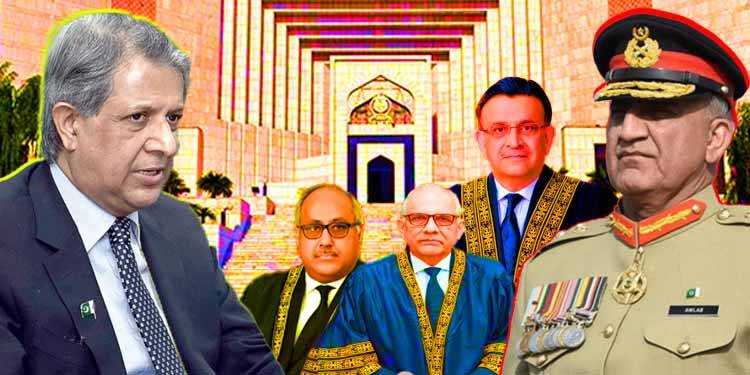
Law Minister Azam Nazir Tarar on Monday claimed Judicial commission of Pakistan deadlock on elevation of junior judges in October 2022 was settled on the advice of former army chief General (r) Qamar Javed Bajwa.
During an interview on the popular current affairs program ‘Aaj Shahzeb Khanzada ke Saath’ on Geo News, the law minister said that General Bajwa had given the government some guarantees and in return wanted the hostilities between the government and Supreme Court of Pakistan to end. The law minister made it clear that he was always against appointment of junior judges to the Supreme Court and had even resigned from his position after voting for them on government’s orders.
In October 2022, the Judicial Commission of Pakistan (JCP) unanimously approved the elevation of IHC Chief Justice Athar Minallah, but elevation of Justice Shahid Waheed and Justice Hasan Azhar Rizvi was approved by majority of 5-4 votes.
When grilled by host Shahzeb Khanzada, Azam Tarar said he wasn’t privy to the guarantees given by the former COAS to the government and was in no position to comment on that.
Commenting on Tarar’s revelations, Shahzeb Khanzada said General Bajwa had been central to all the crises Pakistan was going through for the past several years and after law minister’s latest revelations, it was clear that he was responsible for this crisis too.
How were junior judges elevated to Supreme Court in October 2022?
In the run up to this meeting, a deadlock had ensued in the judicial commission of Pakistan over appointment of junior judges to the Supreme Court. Justice Qazi Faez Isa and Justice Sardar Tariq Masood had opposed the nomination of three junior high court judges in lieu of seniority principle. Member from Pakistan Bar Council, Law Minister Azam Nazir Tarar and then Attorney General Ashtar Ausaf Ali had also supported their stance. Chief Justice Umar Ata Bandial, Justice Ijazul Ahsan, now-retired Justice Sajjad Ali Shah and former Supreme Court judge Sarmad Jalal Osmany had supported the nomination of abovementioned junior judges of respective high courts.
However, after months of painstaking negotiations, Law Minister Azam Nazir Tarar and Attorney General Ashtar Ausaf ended up supporting Chief Justice’s nominees resulting in Justice Shahid Waheed and Justice Hasan Azhar Rizvi’s appointment to the Supreme Court in October 2022 meeting of the JCP.
Justice Qazi Faez Isa pointed out during the meeting that 3 junior judges of high court had been rejected in a JCP meeting in July 2022 but Attorney General Ashtar Ausaf termed the matter had been deferred, not concluded.
The two junior judges, promoted when government ditched the seniority principle, are also part of the bench of 8 who suspended the Supreme Court’s rule and procedures bill passed by Parliament.
Many political and legal commentators have criticised the government for ditching seniority principle which has led to Supreme Court being dominated by junior judges. Some In backdrop of this, Law Minister Azam Nazir Tarar has stated it was then Chief of Army Staff General Bajwa who recommended the matter be settled by supporting nomination of junior judges.
During an interview on the popular current affairs program ‘Aaj Shahzeb Khanzada ke Saath’ on Geo News, the law minister said that General Bajwa had given the government some guarantees and in return wanted the hostilities between the government and Supreme Court of Pakistan to end. The law minister made it clear that he was always against appointment of junior judges to the Supreme Court and had even resigned from his position after voting for them on government’s orders.
In October 2022, the Judicial Commission of Pakistan (JCP) unanimously approved the elevation of IHC Chief Justice Athar Minallah, but elevation of Justice Shahid Waheed and Justice Hasan Azhar Rizvi was approved by majority of 5-4 votes.
When grilled by host Shahzeb Khanzada, Azam Tarar said he wasn’t privy to the guarantees given by the former COAS to the government and was in no position to comment on that.
Commenting on Tarar’s revelations, Shahzeb Khanzada said General Bajwa had been central to all the crises Pakistan was going through for the past several years and after law minister’s latest revelations, it was clear that he was responsible for this crisis too.
How were junior judges elevated to Supreme Court in October 2022?
In the run up to this meeting, a deadlock had ensued in the judicial commission of Pakistan over appointment of junior judges to the Supreme Court. Justice Qazi Faez Isa and Justice Sardar Tariq Masood had opposed the nomination of three junior high court judges in lieu of seniority principle. Member from Pakistan Bar Council, Law Minister Azam Nazir Tarar and then Attorney General Ashtar Ausaf Ali had also supported their stance. Chief Justice Umar Ata Bandial, Justice Ijazul Ahsan, now-retired Justice Sajjad Ali Shah and former Supreme Court judge Sarmad Jalal Osmany had supported the nomination of abovementioned junior judges of respective high courts.
However, after months of painstaking negotiations, Law Minister Azam Nazir Tarar and Attorney General Ashtar Ausaf ended up supporting Chief Justice’s nominees resulting in Justice Shahid Waheed and Justice Hasan Azhar Rizvi’s appointment to the Supreme Court in October 2022 meeting of the JCP.
Justice Qazi Faez Isa pointed out during the meeting that 3 junior judges of high court had been rejected in a JCP meeting in July 2022 but Attorney General Ashtar Ausaf termed the matter had been deferred, not concluded.
The two junior judges, promoted when government ditched the seniority principle, are also part of the bench of 8 who suspended the Supreme Court’s rule and procedures bill passed by Parliament.
Many political and legal commentators have criticised the government for ditching seniority principle which has led to Supreme Court being dominated by junior judges. Some In backdrop of this, Law Minister Azam Nazir Tarar has stated it was then Chief of Army Staff General Bajwa who recommended the matter be settled by supporting nomination of junior judges.

